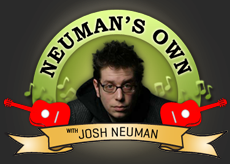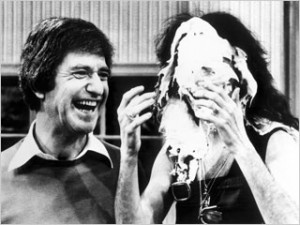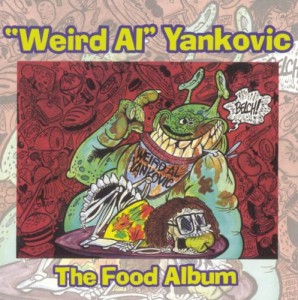Neuman's Own: Music About Food Gains Some Weight
posted in: Features
 In the two weeks since it’s been posted, Vegan Black Metal Chef: Episode 1 Pad Thai has been viewed over one million times. Ostensibly a parody of cooking culture today, the viral video surprisingly doesn’t play out like much of a punch line. It’s unclear how many of the one million viewings have lasted the duration of the fourteen-minute long video, but for those who do make it past nine minutes of shtick, it’s easy to forget, for example, when Black Metal Chef slices a tomato with a dagger. And that’s precisely the point”the vid isn’t intended to be received as just a comedy sketch, but as the first in an ongoing series. According to the Why Vegan? section of the Vegan Black Metal Chef Web site, Veganism is perhaps the most beneficial non spiritual (and sometimes spiritual) thing you can do. At the end of the Web site mission statement are three embedded PETA vids, one about KFC’s main ingredient (cruelty) narrated by a suitably somber-for-the-occasion Pamela Anderson.
In the two weeks since it’s been posted, Vegan Black Metal Chef: Episode 1 Pad Thai has been viewed over one million times. Ostensibly a parody of cooking culture today, the viral video surprisingly doesn’t play out like much of a punch line. It’s unclear how many of the one million viewings have lasted the duration of the fourteen-minute long video, but for those who do make it past nine minutes of shtick, it’s easy to forget, for example, when Black Metal Chef slices a tomato with a dagger. And that’s precisely the point”the vid isn’t intended to be received as just a comedy sketch, but as the first in an ongoing series. According to the Why Vegan? section of the Vegan Black Metal Chef Web site, Veganism is perhaps the most beneficial non spiritual (and sometimes spiritual) thing you can do. At the end of the Web site mission statement are three embedded PETA vids, one about KFC’s main ingredient (cruelty) narrated by a suitably somber-for-the-occasion Pamela Anderson.

If you allow me to digress for a moment: With so much lip flapping about organic, bio-tech, locally-grown, cholesterol-lowering, cancer-inducing foods, our popular culturehas (not surprisingly) become very serious about food. It’s a strange turn since just a generation ago food seemed like a funny thing. Think of the pie that Soupy Sales used to throw into the faces of the unsuspecting guest or John Belushi yelling food fight! in Animal House. Food, for one reason or another, was shorthand for the mundane, the lowbrow. And yes, that extended to the culture’s popular music. Going back to the cover of Herb Alpert & The Tijuana Brass Band’s Whipped Cream And Other Delights (A&M, 1965) with its cream-covered model to Iggy Pop’s 1977 track Dog Food (1977) to REO Speedwagon’s You Can Tune a Piano, But You Can’t Tuna Fish (Epic/Legacy, 1978), food signifiers functioned to make it clear when a musician wasn’t taking his work too seriously. The everyday nature of food was a counter-weight to anyone attributing lofty (nay, artistic) intentions to a music-maker.
 The trend continued through the ’80s, perhaps reaching its crescendo with Weird Al Yankovic’s The Food Album (Rock ˜n Roll, 1993), a compilation of ten previously released songs about sustenance. There was My Bologna (a parody of My Sharona), Addicted to Spuds (Addicted to Love) and, of course, the song that might have been the first to put him on the map, Eat It (Beat It), which began with the refrain: How come you’re always such a fussy young man?/Don’t want no Cap’n’ Crunch/ Don’t want no Raisin Bran/ Don’t you know that other kids are starving in Japan?/So eat it, just eat it!
The trend continued through the ’80s, perhaps reaching its crescendo with Weird Al Yankovic’s The Food Album (Rock ˜n Roll, 1993), a compilation of ten previously released songs about sustenance. There was My Bologna (a parody of My Sharona), Addicted to Spuds (Addicted to Love) and, of course, the song that might have been the first to put him on the map, Eat It (Beat It), which began with the refrain: How come you’re always such a fussy young man?/Don’t want no Cap’n’ Crunch/ Don’t want no Raisin Bran/ Don’t you know that other kids are starving in Japan?/So eat it, just eat it!
What all of this music had in common was the way it positioned food as part of larger cultural jokes, and in the case of Yankovic, as a tried and true punchline. But today, amidst the serious business of raising food consciousness, food’s role in popular music has changed. Reflecting what’s gone on in the larger society, its invocations feel much weightier.
Just a small sample serving illustrates the point. Think of R. Kelly’s The Chocolate Factory (Jive, 2003), which invoked food to riff dangerously close to the singer’s alleged sexual propensities and, perhaps in a nod to Dahl’s masterpiece, to reference childhood fantasies (the singer was eventually acquitted in a child pornography case that lasted six years). Or Matthew Herbert’s Plat Du Jour (Accidental, 2005), a veritable sonic Fast Food Nation, which samples real-life nature snippets like chickens being prepared for slaughter and weaves them into songs.

Meanwhile, indie rockers are taking the food movement as seriously in the twenty-first century as their predecessors took the Civil Rights Movement in the twentieth. TakeKara Zuaro’s 2007 cookbook I Like Food, Food Tastes Good: In the Kitchen With Your Favorite Bands or Kay Bozich Owens and Lynn Owens’ 2008 Lost in the Supermarket: An Indie Rock Cookbook (Soft Skull). If that’s not enough Steve Albini, member of iconic acts Big Black and Rapeman and producer of such legendary acts as Nirvana, the Pixies and PJ Harvey, has just launched his own food blog.
Vegan Black Metal Chef could only come about in a culture that takes food as seriously as ours. Watch the video yourself and you will undoubtedly find yourself chuckling aloud when the demonically-clad chef inadvertently drops too much tamarind into his serving bowl and snarls, I hate it when that happens, but the context couldn’t be more serious. In the words of VBMC, Most animals raised for food live in what I would consider a darker hell than one even I could ever imagine¦. I could go on and on with this, but I will just post some videos instead. The message couldn’t be clearer: even in the world of a dark, rubber-clad vegan offering up cooking tips, food is no laughing matter.
